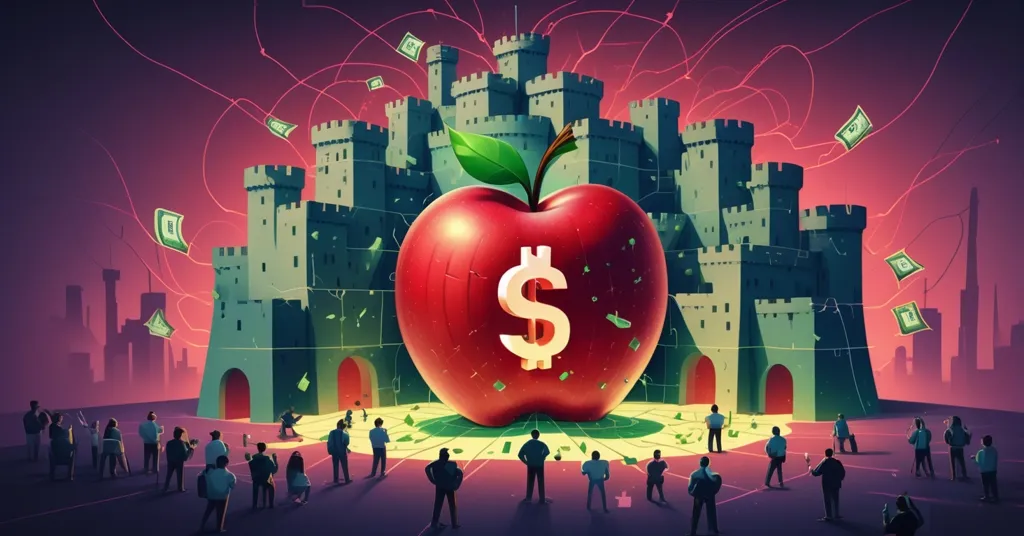Apple Hit with £1.5B Lawsuit: UK Ruling Slams App Store Fees, Boosts Decentralization Push

Apple Faces Massive Payout to UK Users After Landmark Court Ruling on App Store Practices
A staggering verdict from London has Apple on the ropes, facing potential payouts of hundreds of millions to UK iPhone and iPad users. The Competition Appeal Tribunal (CAT) has ruled that the tech behemoth abused its dominant position in the app market by imposing unfair and excessive commission fees on developers—costs that were slyly passed on to consumers.
- Ruling Impact: Apple deemed guilty of exploiting market dominance with inflated App Store fees from 2015 to 2020.
- Lawsuit Value: Mass action valued at £1.5 billion ($2 billion) for millions of UK iOS users.
- Broader Context: First major tech class action to reach trial in the UK, marking a turning point in Big Tech accountability.
The Competition Appeal Tribunal in London dropped a legal bombshell on Thursday, finding that Apple shamelessly leveraged its chokehold on the app distribution market by charging developers outrageous commissions between October 2015 and December 2020. If you’re new to this, Apple’s App Store is the sole portal for apps on iOS devices—a digital fortress where Apple plays judge, jury, and tax collector, often taking a 30% cut on transactions. The tribunal ruled this rate was unjust compared to a more reasonable 17.5%, and worse, about 50% of that overcharge was shoved onto consumers through higher app prices or in-app purchase fees.
Let’s break it down with a quick example. Imagine shelling out $1.99 for an in-app feature—roughly 30 cents of that could be Apple’s cut, with a portion deemed pure overcharge by the tribunal. Scale that up across millions of transactions and users, and you’re staring at a £1.5 billion ($2 billion) lawsuit. This mass action represents countless UK iPhone and iPad users, and if damages are fully awarded at next month’s hearing, it could mean a tidy sum for those affected, though exact per-person figures are still pending. Leading this charge is British academic Dr. Rachael Kent, who’s made it her mission to drag tech giants into the accountability spotlight.
“Today’s ruling sends a clear message: no company, however wealthy or powerful, is above the law,” declared Dr. Kent.
“This is a landmark victory, not only for App Store users, but for anyone who has ever felt powerless against a global tech giant,” she added with unmistakable resolve.
Apple, as expected, isn’t going quietly. The company has pledged to appeal, arguing that the tribunal’s decision ignores the so-called competitive nature of the app economy and discounts the security benefits of its tightly curated ecosystem. To give context, Apple pitches its App Store as a safe haven—every app is rigorously screened for privacy and safety, unlike the free-for-all Android landscape where sideloading and third-party stores are fair game. But let’s be real: is this about consumer protection, or just a fancy excuse to justify a 30% ransom fee?
“This ruling overlooks how the App Store helps developers succeed and gives consumers a safe, trusted place to discover apps and securely make payments,” an Apple spokesperson insisted.
“The App Store faces vigorous competition from many other platforms—often with far fewer privacy and security protections,” they added, sidestepping the fact that iOS users have no alternative app stores to turn to.
Let’s cut through the PR spin. Apple’s talk of “competition” rings hollow when iOS users are trapped in a single, non-negotiable marketplace. The tribunal saw right through it, labeling Apple’s tactics as blatantly anti-competitive. And this isn’t just a UK grudge match. In the US, Epic Games—yes, the Fortnite folks—has been locked in a legal slugfest with Apple over similar App Store policies, winning partial concessions like allowing external payment links, though Apple fought tooth and nail. Meanwhile, European antitrust regulators have slapped Apple with complaints over new App Store terms that allegedly flout the EU’s Digital Markets Act. The noose is tightening.
A Historic Blow to Big Tech Dominance
This case isn’t just a fine or a footnote—it’s a historic milestone. It’s the first mass lawsuit against a major tech company to reach trial under the UK’s class action system, which just marked its 10th year. Think of this legal mechanism as a way for regular people to team up against corporate heavyweights—picture a whole town uniting to sue a crooked landlord for jacking up rent. The win here, as detailed in reports on the potential millions Apple might pay to UK users, could inspire a wave of similar actions, and the timing couldn’t be worse for Big Tech. Google is next in the firing line with a lawsuit over Play Store commissions set for trial in October next year, while Amazon and Microsoft face their own hefty claims at the CAT. It’s open season on digital monopolies, and regulators worldwide are watching closely.
Stepping back, this ruling taps into a deep well of frustration with Big Tech’s unchecked power. Governments and everyday users are fed up with app store policies that function like digital shakedowns, skimming off the top while developers and consumers bear the brunt. For developers, Apple’s 30% fee—recently cut to 15% for smaller players after massive backlash—can be the difference between staying afloat or sinking. For users, it’s a slow bleed of microtransactions, with every in-app purchase or subscription inflated to cover Apple’s slice. The tribunal’s finding that half the overcharge hit consumers directly is a brutal reality check—we’re all footing the bill for Apple’s dominance, whether we realize it or not.
A Mirror to Centralized Finance: Why Crypto Fans Should Care
For our Bitcoin and crypto crowd, this drama should strike a chord. Apple’s App Store isn’t just a tech monopoly; it’s a glaring parallel to the centralized financial systems we’ve been fighting since Bitcoin’s genesis block. Just as banks and payment processors slap on hefty fees and control access with an iron grip, Apple plays gatekeeper to the app world, squeezing developers and users without offering alternatives. If this ruling shows anything, it’s that centralized power—whether in tech or finance—often breeds exploitation. Bitcoin emerged to shatter that in money; could blockchain tech do the same for app distribution?
Picture a decentralized app store running on a blockchain like Ethereum or a scalable layer-2 solution. Developers publish apps directly, users download without a middleman, and fees are negligible or managed via transparent smart contracts. No 30% “tax,” no random bans, no single entity calling the shots. Platforms like F-Droid, an open-source app store for Android, already offer a glimpse of this future, though they lack the mainstream polish of Apple’s ecosystem. A blockchain-based alternative could push the envelope further, embodying crypto’s core principle of permissionless access. But let’s not get starry-eyed—challenges like scams, clunky interfaces, and regulatory pushback would need serious tackling, much like crypto’s wild early days.
What’s on the Horizon: Cash Hit or Mere Reputation Dent?
Next month’s hearing will be the moment of truth. It’ll hash out how damages are calculated—potentially setting a benchmark for future payouts—and address Apple’s desperate bid to appeal. If Apple’s appeal flops, the financial sting could be massive, though let’s not pretend a $2 billion hit is anything more than a rounding error for a company with a market cap exceeding $3 trillion. The real wound is to their image. This isn’t just about money; it’s about proving that even the biggest dogs can be brought to heel. And for those of us pushing decentralization, it’s a stark reminder that centralized giants—be they in tech or banking—aren’t untouchable.
Long-Term Shockwaves for App Economies
Peering further ahead, this verdict could upend the very foundation of app store models. If Apple and its ilk are forced to slash fees or allow third-party marketplaces, we might see a burst of innovation reminiscent of the early smartphone boom. But there’s a flip side to chew on: could less oversight from Apple unleash a torrent of junk or malicious apps, as the company keeps harping on? Playing devil’s advocate for a moment, Apple’s suffocating control does filter out some trash—something decentralized platforms might grapple with unless they nail community governance. Still, the trade-off of freedom versus safety is a debate worth having, especially for a community forged in Bitcoin’s unruly, take-no-prisoners origins.
Key Questions and Takeaways for Our Crypto Community
- What did the tribunal expose about Apple’s dirty tactics?
The Competition Appeal Tribunal ruled that Apple abused its market dominance by hitting developers with unfair commissions—up to 30%—and stifling competition in app distribution from 2015 to 2020, with half the overcharge passed to consumers via pricier apps. - How much could UK users pocket from this £1.5 billion lawsuit?
The lawsuit totals £1.5 billion ($2 billion), but individual payouts are still unclear until next month’s hearing locks in the calculations—potentially a meaningful sum for millions of iOS users. - Why should Bitcoin and crypto advocates pay attention to this Big Tech takedown?
This ruling lays bare the flaws of centralized control, echoing problems in traditional finance, and strengthens the argument for decentralized systems where no entity—Apple or a bank—can play dictator and leech fees. - Will Apple’s appeal turn the tide, or is this a lost cause?
Apple’s appeal, up for debate next month, might stall or adjust the payout, but the tribunal’s harsh take on anti-competitive behavior suggests a rough road ahead for the tech giant. - Could this fuel decentralized app stores powered by blockchain?
Damn right—this case highlights the pitfalls of centralized gatekeepers, likely speeding up interest in blockchain platforms where developers and users connect directly, free from corporate extortion. - Are there risks to abandoning Apple’s walled garden for decentralization?
Sure—without Apple’s heavy hand, decentralized app stores might face issues like scams or shoddy apps, a trade-off we’ve wrestled with in crypto’s infancy, but one worth addressing for real autonomy.
For the moment, Apple remains under intense scrutiny as it wades through this legal swamp. But the aftershocks are already reverberating. This isn’t just a triumph for UK consumers; it’s a loud warning to every tech titan abusing market power. And for those of us rooting for decentralization—whether through Bitcoin in finance or open protocols in tech—this feels like a crack in the armor of the old guard. If a colossus like Apple can be rattled, centralized finance is next in line for a reckoning. Disruption doesn’t wait, and we’re only at the starting gate.



